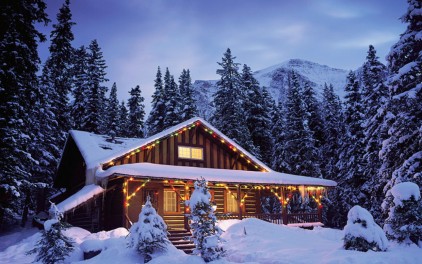From my vantage point on the ramparts in Wisconsin, a white Christmas is a distinctly unlikely possibility. The strange fact regarding Christmas in the northern climes is that most everybody hopes they will experience Christmas under a heavy blanket of the whitestuff, and then insist that for the rest of the forlorn winter they will be free of the burden of snow. The connectivity of Christmas with snow is obviously a phenomena of its northern European inflections. The birth of Christ in the sacred isolation of a manger occured in Bethlehem, Judea, a region of earth in which the climate is obviously not conducive to snow. The great proportion of Christians in the world celebrating the Christmas event live in the temperate band around the equator, and will likely never experience snow without travelling to it.
The image of a white Christmas as a positive and comforting vision is I think directly related to the underlying unique conceptionalization of Christmas as an event celebrating man being at peace with himself. The enormous stresses and strains of a modern society allow for almost no period of restful reflection and introspection. The holiday of Christmas itself has been subsumed by a commercial pressure to buy and exchange gifts, find time to acknowledge everyone who interacts with you in your life, and provide these public expressions in a short pressure cooker in time while continuing to perform your daily duties. It all sounds exhausting, doesn’t it? And thus the power of snow to put a progressive blanket that slows all that hyperkinetic activity to a halt. We envision ourselves having a moment where the element of snow has put all the world on hold, and we are therefore forgiven for taking a collective breath, and just relaxing. The momentary lull allows the sublimated emotions to take root – man at peace with himself and with others, the beauty of the natural world, the shared experience of slowing down and taking stocking of one’s blessings, the direct connection of man with his God through the gift of His only Son. It can all happen without snow, but snow in its universal whiteness blanketing all, and exempting none, makes these subliminal emotions a communal experience shared in real time.
In 1940, Irving Berlin, the songwriter, recognized the power of juxtaposing the images of snow and Christmas in a song that has become the pre-eminent reflection of the emotions of the holiday. He was writing in balmy California where snow had no chance of occuring in his immediate pervue but understood what people were seeking was a return to a simpler less stressful reflection of the holiday. The world was at war and the United States struggling to stay out of the confligration. The future was highly uncertain, and frankly, felt ominous. Berlin, maybe the best reflector of his nation’s emotional pulse, projected in the song White Christmas a world where emotions were cooled by a blanket of snow, where the centerpiece of all thoughts was home, and no one need feel negativity.
The song was not an immediate success, but as the nation became consumed by war and 15 million men and women were pulled far from their homes into mortal danger, the song struck a powerful chord with the nation, and has never let go. The version performed by Bing Crosby in 1942, and rerecorded in 1947 has become the greatest single recording seller of all time at over 50 million, and the many versions by other artists have sent White Christmas well over 100 million in sales making it easily the most recorded song of all time. The song became an Academy Award winner in the 1942 movie Holiday Inn and likely secured for Crosby the position as chief interpretor of the Christmas song catalogue for the rest of his life. Corny in its setting and using a female performer to voice over Crosby’s duet partner, the original movie performance still holds a special power of the Christmas song genre to this day. We are always caught by the song’s special awareness of how complicated the world has become, and how we all need to take a breath, and forgive ourselves for our pressured lives.

The connection is the North Pole. A white isolated place where we can escape the stresses of modern society. 🙂